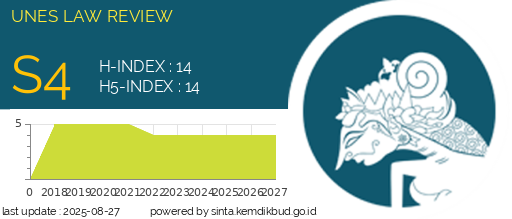Implementation of The Trias Politica Concept and The Prospects For Establishing New High State Institutions in Indonesia
DOI:
https://doi.org/10.31933/unesrev.v6i1.1111Keywords:
Trias Politica, High State Institution, the 1945 constitution of the Republic of IndonesiaAbstract
State institutions play a significantly central role in the implementation of governance. The doctrine of trias politica has been implemented in the structure of the Indonesian state, establishing a division of powers among three branches: the executive, legislative, and judicial. Nevertheless, over time, Indonesia has expanded the trias politica doctrine by incorporating a novel branch of power, namely the examinative institution operated by the The Audit Board of the Republic of Indonesia. The high state institutions established in accordance with the constitution enjoy robust and enduring positions and authorities. On the other hand, state institutions formed through legislation tend to possess comparatively weaker and non-permanent positions and authorities, as they are susceptible to amendments or even dissolution by the House of People’s Representatives (Dewan Perwakilan Rakyat, DPR), which holds legislative functions. The Ombudsman and Corruption Eradication Commission (Komisi Pemberantasan Korupsi or KPK), as auxiliary state institutions playing pivotal roles in the governance system, face vulnerability due to their establishment being founded on statutory laws. Consequently, there arises an urgent necessity and opportunity for the establishment of a new high state institution by elevating the Ombudsman and KPK to the status of high state institutions. However, there are inherent challenges that must be navigated, specifically the requirement for an amendment to the 1945 Indonesian Constitution, contingent upon the political will of the members of the People's Consultative Assembly (Majelis Permusyawaratan Rakyat or MPR).
Downloads
References
Asshiddiqie, J. (2010). Perkembangan dan Konsolidasi Lembaga Negara Pasca Reformasi. Jakarta: Sinar Grafika.
Asshidiqie, J. (2005). Konstitusi dan Konstitualisme, Jakarta: Konstitusi Press.
Budiardjo, M. (2008). Dasar-Dasar Ilmu Politik. Edisi Revisi, Cetakan Pertama. Jakarta: Gramedia, 2008.
Ibrahim, J. (2007). Teori dan Metodologi Penelitian Hukum Normatif. Malang: Bayumedia Publishing.
Marpaung, L.A. (2018). Ilmu Negara. Jakarta: Penerbit Andi.
Marzuki, P.M. (2008). Metode Penelitian Hukum. Jakarta: Kencana Prenada Media Group.
Marzuki, P.M. (2009). Penelitian Hukum. Jakarta: Kencana.
Montesquieu. (2007). The Spirit of Laws, Dasar-Dasar Ilmu Hukum dan Ilmu Politik, diterjemahkan oleh M. Khoiril Anam, Bandung: Nusamedia.
Soekanto, S. (1986). Pengantar Penelitian Hukum. Jakarta: Universitas Indonesia.
Wirjono, P. (1983). Azas-Azas Hukum Tata Negara di Indonesia. Jakarta: Dian Rakjat.
Asshiddiqie, J. (2008). Hubungan Antar Lembaga Negara Pasca Perubahan UUD 1945. Makalah disampaikan dalam Seminar Nasional Sekretariat Negara Republik Indonesia, Jakarta, 25, 1-26.
Mariana, M. (2017). Check and Balances Antar Lembaga Negara di Dalam Sistem Politik Indonesia. LOGIKA Jurnal Ilmiah Lemit Unswagati Cirebon, 12(1), 20-28. https://scholar.archive.org/work/ltyozuiku5cyzgnzebbmgafbeq/access/wayback/http://jurnal.unswagati.ac.id/index.php/logika/article/viewFile/967/638.
Muslim, A. (2013). Interaksi Sosial dalam Masyarakat Multietnis. Jurnal Diskursus Islam, 1(3), 483-494. https://journal3.uin-alauddin.ac.id/index.php/diskursus_islam/article/download/6642/5402.
Pujianti, et.al. (2020). Reformulasi Stolen Asset Recovery dalam Sistem Pemeriksaan Delik Korupsi Sektor Swasta. Jurnal Hukum Lex Generalis, 1(4), 43-58. https://doi.org/10.56370/jhlg.v1i4.207.
Roza, D. (2019). Partisipasi Masyarakat dalam Pembentukan Perundang-Undangan Untuk Mewujudkan Indonesia Sejahtera dalam Pandangan Teori Negara Kesejahteraan. Jurnal Cendekia Hukum, 5(1), 131-144. http://doi.org/10.33760/jch.v5i1.185.
Ruhenda, et.al. (2020). Tinjauan Trias Politika Terhadap Terbentuknya Sistem Politik dan Pemerintahan di Indonesia. Journal of Governance and Social Policy, 1(2), 58-69. https://doi.org/10.24815/gaspol.v1i2.18221.
Thallah, HM. (2009). Teori Demokrasi dalam Wacana Ketatanegaraan Perspektif Pemikiran Hans Kelsen. Jurnal Hukum, 16(3), 483-494. https://doi.org/10.20885/iustum.vol16.iss3.art6.
Downloads
Published
How to Cite
Issue
Section
License
Hak cipta :
Penulis yang mempublikasikan manuskripnya di jurnal ini menyetujui ketentuan berikut:
- Hak cipta pada setiap artikel adalah milik penulis.
- Penulis mengakui bahwa UNES Law Review berhak menjadi yang pertama menerbitkan dengan lisensi Creative Commons Attribution 4.0 International (Attribution 4.0 International CC BY 4.0) .
- Penulis dapat mengirimkan artikel secara terpisah, mengatur distribusi non-eksklusif manuskrip yang telah diterbitkan dalam jurnal ini ke versi lain (misalnya, dikirim ke repositori institusi penulis, publikasi ke dalam buku, dll.), dengan mengakui bahwa manuskrip telah diterbitkan pertama kali di Jurnal UNES Law Review.


















